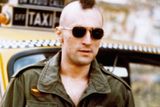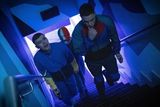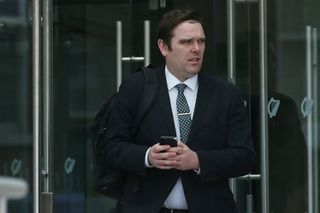How Robert De Niro transformed from shy teen to screen icon

As a young man, Robert De Niro was an elusive character, reluctant to give interviews and either unwilling or unable to discuss the process behind his great performances. In recent years, though, he has grown more forthcoming, and the arrival of Donald Trump on the American political scene has inspired a series of impassioned outbursts.
During the 2016 election campaign, De Niro, a lifelong Democrat and big Obama fan, described Trump as "blatantly stupid", adding darkly: "He wants to punch people in the face? I'd like to punch him in the face." Last year, while introducing Bruce Springsteen at the Tony Awards, De Niro was even blunter: "I'm gonna say one thing: f*** Trump."
A vague suspicion that he does not much care for the 45th US president was confirmed last Sunday when De Niro was being interviewed on a CNN morning show. After describing Trump as someone who "should not be president, period", the actor was asked how he felt about those infuriated by his repeated attacks on their country's leader. "F*** 'em," he said, with admirable brevity, and said it again before apologising for swearing on air. Bracing stuff, but over the next few months, the 76-year-old New Yorker will remind us that acting, not political punditry, is still his principal occupation.
The received wisdom is that De Niro blazed a trail through American cinema in the 1970s and '80s with a string of unforgettably intense and focused performances, then lost interest in the craft and began squandering his great talent in dodgy comedies and bad cop thrillers. This argument is grossly unfair.
Robert De Niro in Taxi Driver
The idea that it would have been possible to keep doing immersive method roles into middle and old age is ridiculous, and as he grew older, it was inevitable that De Niro would either retire altogether or take on smaller supporting roles.
If you're still doing four of five films a year in your 70s, it must be because you enjoy it. Some of the later roles he's taken on have been comic, but then again he's rather good at being funny, and while not every film has been worthy of his talent, now and then we get glimpses of genius. His portrayal of Bradley Cooper's concerned father in Silver Linings Playbook was brilliant, and I also liked his turn in Joy.
This week he shows up in Joker, playing a smarmy TV chat-show host with whom failed stand-up Arthur Fleck becomes obsessed. Full of cheese and bluff self-confidence, Murray Franklin seems like an older version of the brittle would-be stand-up De Niro played in Martin Scorsese's The King of Comedy. And next month Scorsese and he will release their ninth feature film together, The Irishman, which represents De Niro's biggest role in years.
It's based on the true story of Frank Sheeran, the mob hitman who supposedly killed corrupt union official Jimmy Hoffa, and during the three-and-a-half hour Netflix-funded epic, De Niro plays Sheeran at various stages of his life through the magic of digital de-ageing. He is, apparently, immense in it, but that should come as no surprise to anyone.
All the truly great actors bring something different to the screen, a unique style or presence that sets them apart. It's impossible to imagine anyone else taking on the challenge of films like Taxi Driver, Mean Streets or Raging Bull with the sustained intensity that De Niro did.
His commitment was total, his acting intelligence formidable, and like Marlon Brando in his pomp, his portrayals of working-class men, soldiers and boxers were utterly convincing. Those early films won him Oscars and a large and passionate fan club, who seem to have found it impossible to forgive De Niro for branching out into character roles, and comedy. Yet one of his most entertaining films is a comedy - Midnight Run.
Robert De Niro with Al Pacino and Ray Romano in his new film 'The Irishman'
Believe it or not, he took to acting as an escape from profound shyness. He was born in Manhattan in 1943, the only child of artist parents who were both prominent players in the vibrant post-war Greenwich Village art scene. They split up when Robert was three: Robert Snr, a talented artist, struggled with depression and his sexual identity for the rest of his life, but he and his son remained close; De Niro recently made available to art historians an intimate diary his dad kept.
He himself, though, could only bring himself to read extracts: "It was sad for me to read," he admitted, "he had his demons - I was sorry."
De Niro was born, then, into a world of culture and relative privilege, in 1943, but he quietly rebelled, joining a gang of street kids who hung around Little Italy, getting into scrapes.
When not out roaming, he was a quiet, shy child, and he first discovered acting at the age of 10, when he was cast as the cowardly lion in a school production of the Wizard of Oz. He took to it, and also became fascinated by cinema: at 16 he dropped out of school to pursue a career in acting.
Robert De Niro in GoodFellas
Success was far from instant, and De Niro laboured in obscurity before making a significant breakthrough. That was on Mean Streets, an edgy, low-budget 1973 New York street drama directed by Scorsese. De Niro's electrifying portrayal of a self-destructive young man called Johnny Boy announced him as a major new talent, and was the beginning of a string of extraordinary performances.
Perhaps acknowledging that De Niro might be the next Brando, Francis Ford Coppola had already cast him as a young Vito Corleone in The Godfather Part II. That won him an Oscar.
Critics and commentators became obsessed by the method extremes De Niro would go to in these iconic roles: he learnt Italian for The Godfather Part II, drove a New York cab while preparing for Taxi Driver, learnt to box (and was pretty good apparently, as Trump should duly note) for Raging Bull, then packed on more than 25kg to play its anti-hero, middleweight Jake LaMotta, as an older man.
But in a way, these exhausting techniques were incidental to the finished product - intense and detailed portrayals of troubled men. Mean Streets, The Godfather II, Taxi Driver, The Deer Hunter, Raging Bull, King of Comedy, The Mission, GoodFellas - for almost two decades it seemed that a Hollywood movie only had weight and quality if De Niro was involved.
The performance I admire the most is in Taxi Driver: loner cabbie and possible Vietnam veteran Travis Bickle has no conception of how far outside the social norm he has drifted, and his inverted logic makes sense only to him. De Niro's nervy walk in the film and his famous mirror scene have been much parodied, but are as good as any acting ever committed to screen.
Something clearly had to give, for De Niro was never going to be able to keep breaking his body on every movie in the pursuit of artistic perfection.
He likes to talk in simple terms about his craft, and recently told The New Yorker that "the more practice you get, the easier it is, the more you can do things with less effort".
This later, more relaxed approach probably began with Midnight Run, Martin Ritt's hilarious 1988 buddy caper in which De Niro played a dyspeptic bounty hunter who's hired to apprehend a fastidious mob accountant played by Charles Grodin.
By taking on roles big, small and varied, he has managed to extend his film career and allowed us to enjoy snatches of brilliance from the greatest screen actor of his generation. And his role in The Irishman will not be the last we'll hear from him.
"I have another movie," he said recently, "that hopefully I'm going to do with Marty. I'm always doing something. And I like to keep busy - what else am I gonna do?"
Political commentary, maybe?
Join the Irish Independent WhatsApp channel
Stay up to date with all the latest news















